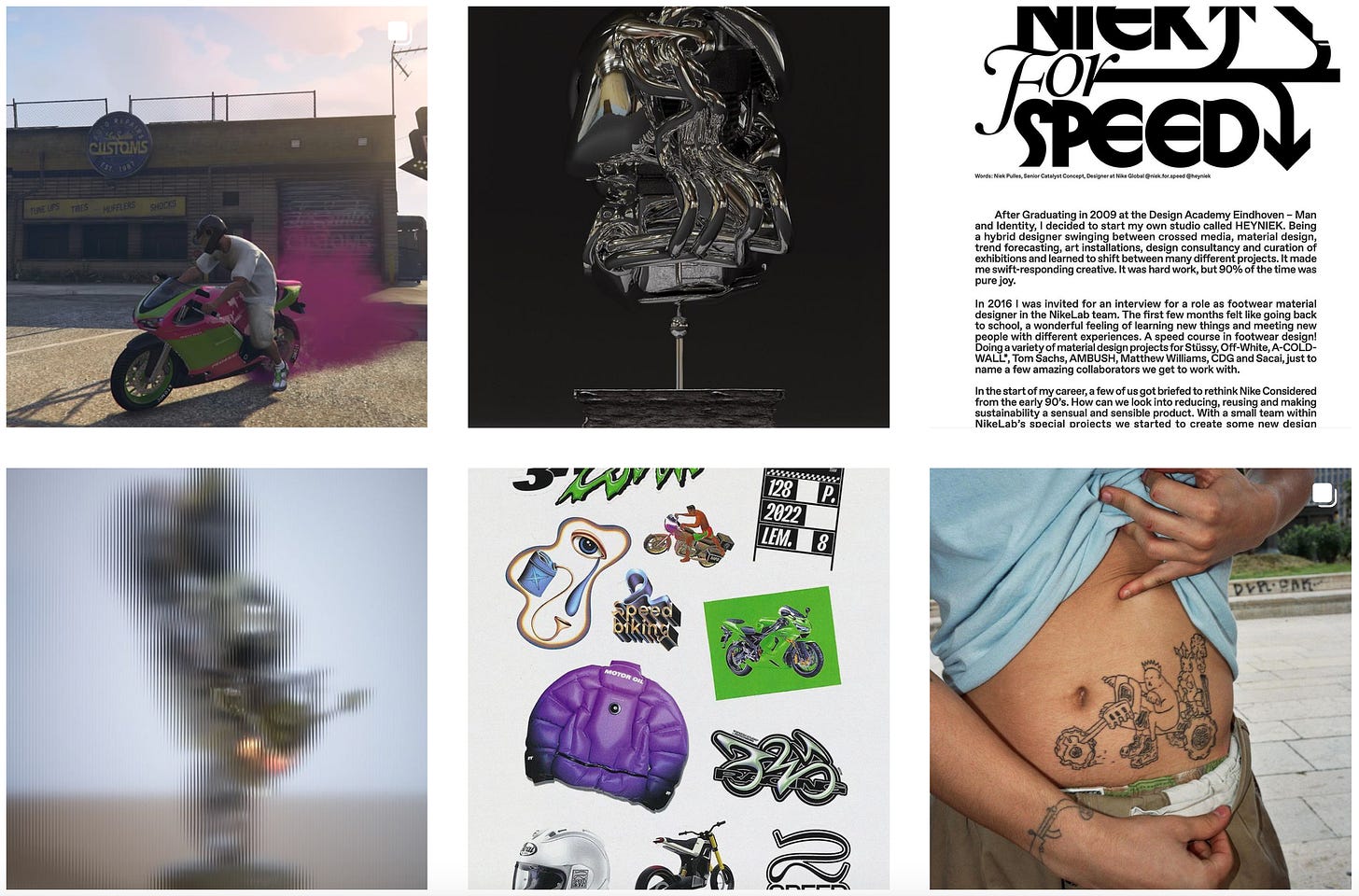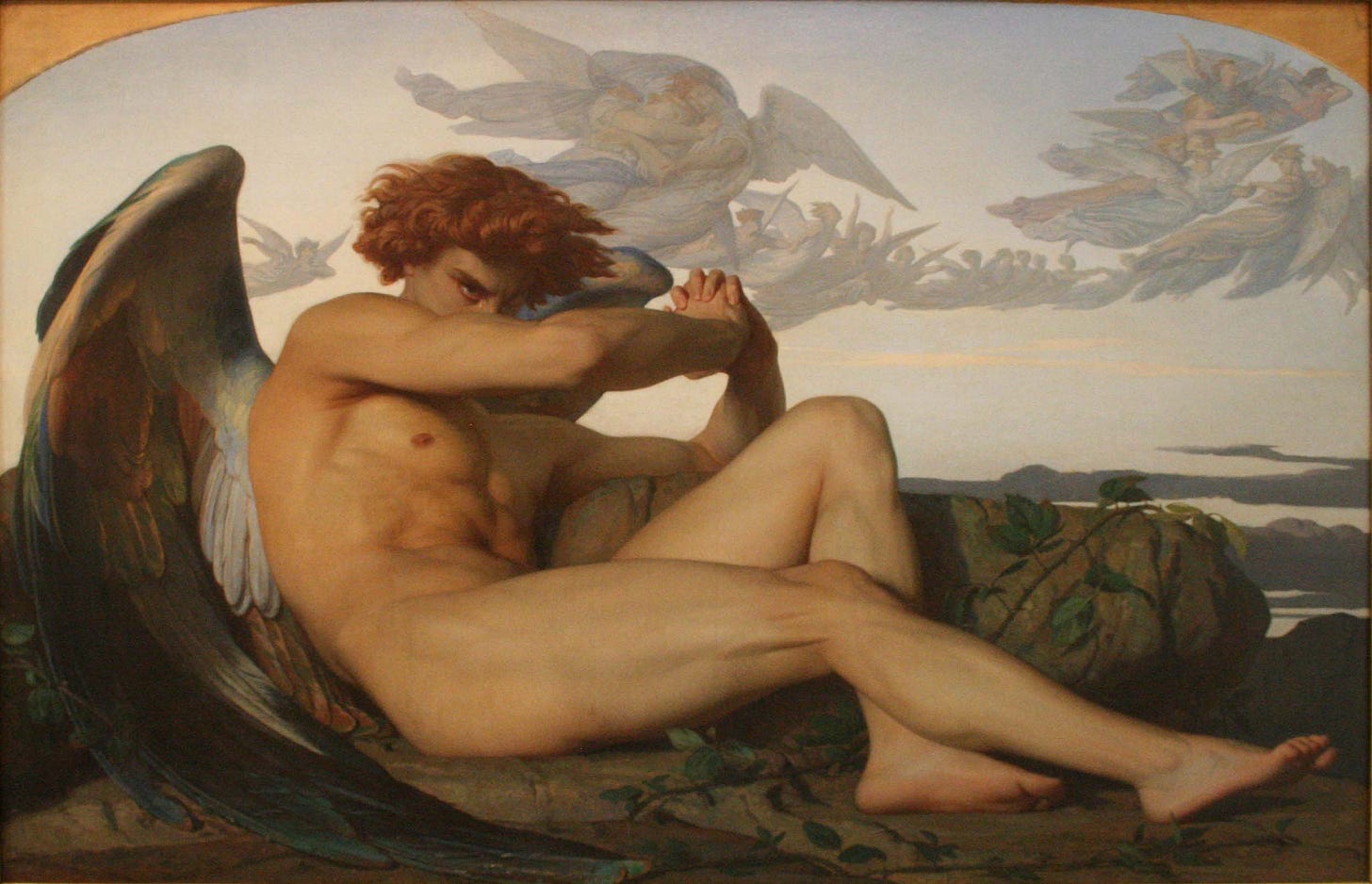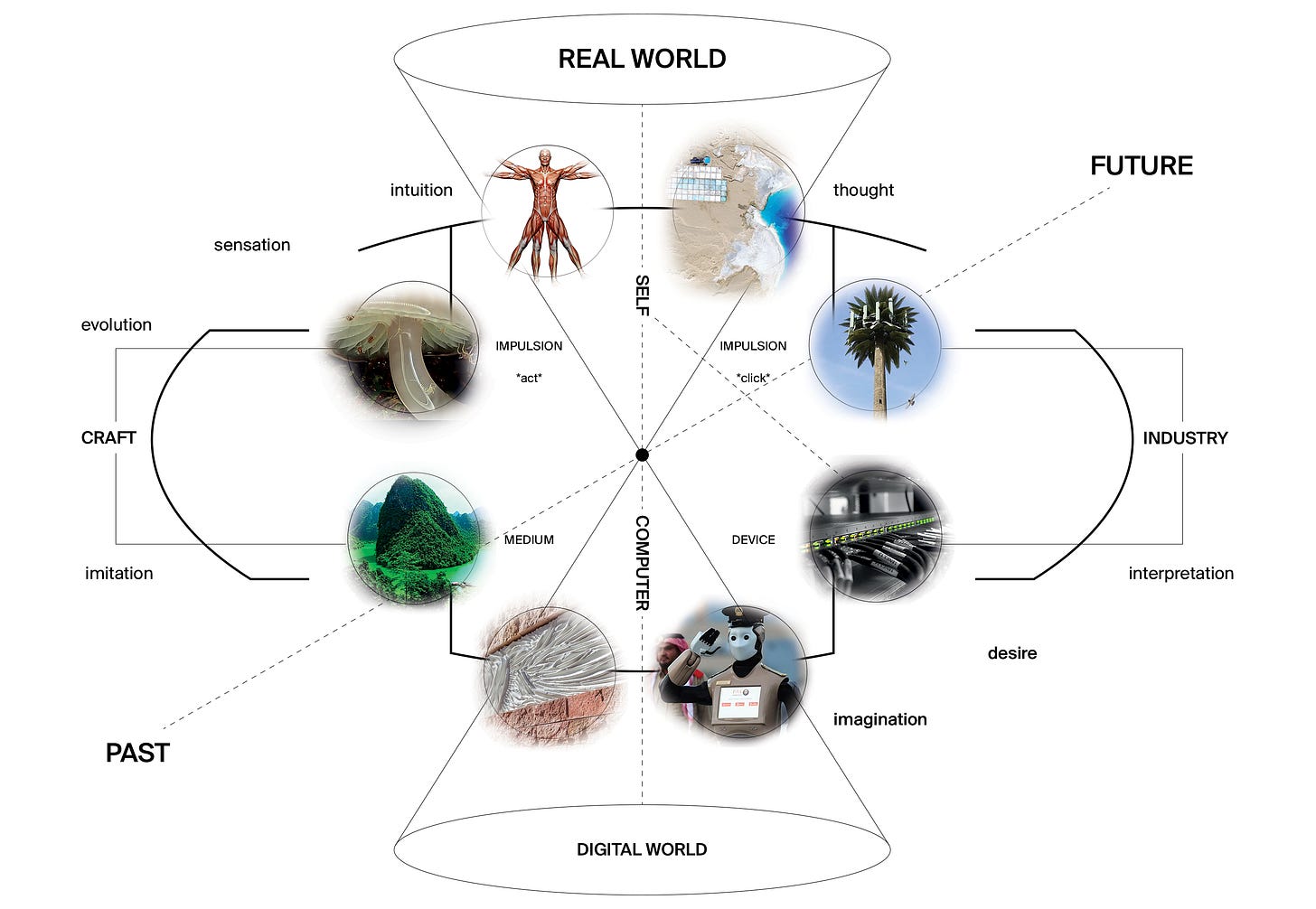Welcome to this auto-initiated cahier focusing on trends, foresight and cultural intelligence founded by 2sight, an independent foresight duo based in Paris. Today, we would like to share some exciting news, aside from the trends-foresight-culture-led articles we usually get to publish: Elodie Marteau (half of 2sight) & Lou Jacobée have partnered with NSS to launch 2 SPEED BIKING Vol. 1 on March 6th. At 2sight, we came with fragments and previews of our favourite articles to discover in this new independent publication.

ABOUT 2 SPEED BIKING
“2 SPEED BIKING.
A project born on Instagram back in 2020 to offer some motorcycle-meets-fashion-arts-design-inspired curation.
A name that illustrates a two-speed world, where traditional takes on motorcycling culture are persistent and seem to evolve faster than creative depictions.
Motorcycling is about speed, mechanics and performance, but it also lives strongly through culture and creativity. All views are valid and needed, yet an apparent gap was waiting to be filled with updated perspectives. An approach we truly believe in and appeared to be aligned with a new audience, craving to explore this world through the beauty of the object and its related fascinating cultural values.
2 SPEED BIKING aims at “taking motorcycle outside of motorcycling”, mixing it with fashion, arts and design. Here, we pose an uncharted and cultured perspective on what contemporary expressions of motorcycling mean today, and in the near future.
2 SPEED BIKING Volume 1 acts as the materialisation of this vision. It is both a medium for visual + cultural curation, and an elevating voice for counter influences.
A platform for expression nurtured by perspectives, point of views and ideas from designers, artists, writers, photographers, painters, brands, communities, and more…
Some of them are riders, others are not.
Some of them are core insiders of the industry, others are passionate amateurs.
2 SPEED BIKING Vol 1. exists thanks to the contribution of guest talents such as Bleu Mode, Ipone, Service Généraux, Sabukaru, Aprilia, Toni Brugnoli, Dab Motors, Burberry, and more.
— A project by Elodie Marteau and Lou Jacobée, powered by NSS.”
THE REBIRTH OF THE BEAUF
words by 2 SPEED BIKING
in collaboration with Fanny Parise, consumer anthropologist and innovation specialist
At 2sight, we’ve recently spotted a cultural shift coming out within global societies and consumption culture: from the glorification of the heroes to the visibilization of losers, villains, inner darkness and failure. On the matter, i-D magazine has recently announced the "death of the Girlboss" under the term “Girlfailure”, while Vlan podcast explores the emergence of the mediocracy as a counter-mechanism against quests for success and performance.
The common ground between all these emerging manifestations? The fall of performative mindsets that have perverted everything, from serendipity to wellbeing — according to a 2022’s study by YPulse, 68% of 13–39-year-olds in the US and Canada agree that the current wellness culture puts too much emphasis on perfection.
2 SPEED BIKING Vol. 1 sheds light on another signal of this reversal phenomenon by digging into the come-back of the motorcycling-related “beauf” archetype in culture-led industries, emanating as a newly-glorified anti-productivity, anti-trends and anti-success symbol:
The beauf — an archetype, or “cultural bubble” as named by anthropologist Fanny Parise, strongly anchored in French culture characterized by a strong social class history, and very much prevalent in the motorcycling-related imaginary — is shifting: from a political and societal scapegoat, to an incarnation of emancipation, of rising above the subjective good taste and trends dominance.
“Fanny Parise provided 2 SPEED BIKING with a clear explanation of this stereotype’s reversal: ‘From a sociological and anthropological point of view we noticed for a few years a loss of impetus of the cult of performance in line with changing criteria of success. We are now on a quest for meaning and no longer necessarily want to have a career: we are centred on a notion of projects and leisure instead’.”
Beyond this newly celebrated mindset, we are also seeing a rehabilitation of the “beauf” aesthetic, a shift of paradigm in which the “beauf”, once associated with bad taste, becomes a driver of coolness. The codes formerly attributed to the “beaufitude” travelled towards democratisation and became anchored in very different socio-cultural environments: proof of this are the “glamping”, a contraction of glamour and camping; the ugly becoming the new standard of beauty and trendiness in the fashion industry; or gear once reserved to un-stylish exploration of the great outdoors becoming a trendy uniform to face our non-extreme city conditions.
“As society loses its bearings, slowing down, not succeeding or failing at rising up the social ladder turns into a positive thing […] At some point, society will jump on what seems to be counter-cultural or dissident [...] These cultural bubbles’ horizontal social notches allow what was beauf and popular or middle class to now become an aesthetic that will infuse all social classes and will be inhabited in different ways. The cultural elite will gentrify this beauf imagery as a strong differentiation and reassuring sign, turned into a cultural and identity anchor in a time of bearings loss and rising populism.” (Fanny Parise, consumer anthropologist and innovation specialist)
“I call the ‘beaufs’ the 'conservators of the authentic' since they are individuals in search of authenticity who will advocate a popular aesthetic to better build their own identity.” (Fanny Parise, consumer anthropologist and innovation specialist)
— Full article available in 2 SPEED BIKING Vol. 1 (p.106-107) launching on 06.03.2023 in Paris and on nss store.
FROM THE MECHANISED PARADISE TO LUCIFER’S GANGS:
MODERN REBELLIONS
words by Adrien Cadiot, Trends & Foresight Consultant and Co-founder of 2sight @adriencadiot
When it comes to foresight “science” — defined by SpringerLink as “a systematic approach to generate future predictions for planning and management by drawing upon analytical and predictive tools to understand the past and present, while providing insights about the future” — we mainly and foremostly study human beings. As Adrien Cadiot (half of 2sight) opens his article for 2 SPEED BIKING Vol. 1: “Humans are creatures of fiction.”
His demonstration keeps going, to a point of focusing on one specific fiction: “A remaining fiction is the belief that associates the future of our civilisation with technological progress and innovation. It is a fiction that favoured unprecedented shifts in society and what led us to produce many innovations, among them motors and later motorcycles.”
Circling back to foresight “science”, the notion of innovation-led progress (with ”innovation” recently pinpointed as the unmissable 2023’s attribute by media FastCompany) is key to identify and decipher, in order to better capture the potential, probable or preferable future directions our human-led cultures take. This is what Adrien Cadiot carried out for 2 SPEED BIKING Vol. 1, leading to an in-depth analysis of the “Mechanised Paradise” and “Lucifer’s Gangs” offering a canvas for modern rebellions:
The mechanised paradise emerged in the early 20th century, right when Taylorism (the scientific organisation of the workforce) was already popularised, letting Fordism becoming its heir and spreading as an economic and geopolitical weapon supported by the deployment of petroleum markets. In this paradise, technology and machines were the worshipping gods, holding the promise of salvation and a more desirable future for the occidental world. The cult had a name: technocracy. The mission being: speed and betterment. Then, motors and automation appeared as the ultimate solution.
“In the technocracy everything aspires to become purely technical, the subject of professional attention. The technocracy is therefore the regime of experts — or of those who can employ the experts.” (The Making of a Counter Culture, Theodore Roszak, 1969)
[…] From representing an object promoting technology and progress, the motorcycle became an icon for aspiring marginalised people who wanted to ride away from the conventional roads of society.
[…] Instead of serving and embracing the lights of the techno-solutionist church, bikers embraced an alternative relationship with technology, where autonomy and independence were facilitated by the reappropriation of the tools and mechanics provided by industrial innovations. Coming from this mechanised paradise, bikers became the fallen angels mastering their own destiny, refusing to let go and surrender to the experts of the technocratic heaven.
[…] Fallen angels also ritualise their cult during organised rallies, clubs and peri-urban races. They collectively praise the experience of the sublime through their immersive journeys and heightened senses, where each connects on an even deeper level with the landscapes around them and their object of worship becomes an extension of their own body. They both have the physical ability and technological capacity to experience a reachable and sensational salvation provided by adrenaline.
“This idea of immersive travel and sharpened senses, of an experience that is somehow more deeply embedded in reality, is the very marrow of the motorcycle's enduring appeal, distilling its contrasting relationship to the automobile and everything for which that vehicle has come to stand in American culture.” (Croke, 2015)
[…] Just like an anti-fashion statement, bikers embrace difference, facing the glamorisation of the overload of consumption and technology. They produce counter-fictions and cults which federate organised gangs. By taking non-conventional societal roads, they create new cultural trends.
— Full article available in 2 SPEED BIKING Vol. 1 (p.060-065) launching on 06.03.2023 in Paris and on nss store.
URBAN CULTURE’S CULTURAL RELEVANCE
Interviewer: 2 SPEED BIKING
Interviewee: WWWESH STUDIO™, Multidisciplinary Creative Studio @wwwesh.studio
Related to the urban culture — i.e. “the meanings, ways of life, and social practices associated with the modern city” – is the Urbancore. With 441.1 million views on TikTok (March 2023), the #urbancore aesthetic does not lose popularity and still fascinates audiences — despite the apparition of the Cottagecore countermovement a few years ago, pushing back productivity cults.
And yet, despite the undisputable over-presence, hegemony and success of the urban culture within lifestyle-oriented industries (fashion being the top one), at 2sight we’ve recently identified some early signs of fatigue when it comes to this culture and related (sub)cultures. In the streetwear ethnology for instance, it seems that the era of never-ending collabs, re-mixes and re-makes are coming to a probable end, leaving space for tailoring and Ivy League-inspired preppy resurgence. Yes, but… on the other hand, data from the StockX platform disagree with this theory, and rather call out a “collab fatigue myth”.
Maybe it’s not about “how many hype-driven urban culture’s initiatives is too many?”, but rather about cultural relevance. Proof of this assumption is the loud success of London-based Nike’s latest collaborator Corteiz: as The Next Cartel deciphers, “[Corteiz’s] value is anchored in its cultural impact, and subsequently, relevance. It’s not about how much money you rake in, but about how many minds they can engage. How many people they can wake up.”
Moving from urban culture to relevance (illustrated by the above Corteiz case) leads to Paris and Tokyo-based WWWESH STUDIO™, which engaged with 2 SPEED BIKING in a conversation about their multi-disciplines, multi-talents, multi-inspirations… leading back again to urban culture’s relevance:
WWWESH STUDIO™ is intriguing by its unconventional name and the on-point urban references found in their work. In short, WWWESH STUDIO™ is a multidisciplinary studio using a wide range of creative expression to give birth to ideas through forms and concept, visual content, or experiential installations. They quickly became a reference symbol to the contemporary era's new generation. The founders, Pierrick and Antoine, are taking pride in the urban and cultural references they highlight in their creations for Nike, Lacoste, EA Sport, and more. Also to get noticied is the undeniable reign of motorcycling-inspired cues across their work […]
“WWWESH STUDIO™ results in the association of the word ‘wesh’, which embodies the street culture [in French] that inspires us, with the three ‘W’ symbolising the digital era in which we grew up. Culture is about history, so the notion of the past is here, but it is also strongly related to this idea of the now. When we approach the digital world, it is about the future as we are constantly looking for innovation. This entire digital universe is anchored in this perpetual quest for the unprecedented, the extraordinary, the ‘never-seen-before’.” (WWWESH STUDIO™)
“We draw inspirations from various different universes that fascinate us and which we then cross-breed to give birth to new intentions. This is what makes our creative proposal so diverse. Popular cultures, in general, inspire us: music, food, sports, arts, or fashion. We are attracted by the hijacked usage of an object’s primary function — meaning how it is reappropriated in a new context. It can apply to a space, an information, a language, a graphic cue, a piece of cloth or even a sound. It’s always interesting to testify of the journey an idea takes before reaching its final stage. The same idea can literally go through various reflective states and merge with other concepts.” (WWWESH STUDIO™)
“We see beauty in an engine or a mechanical item, where design comes from the function itself in order to meet a specific need. At this level, it is pure engineering. What inspires us is the intelligence and ingenuity that lie behind these manufacturing processes, assembling methods and materials’ usage and treatment.” (WWWESH STUDIO™)
“The very fact of defining the motorcycling world as a culture means by essence that it is an ever-evolving environment. Various factors contribute to its evolution, such as people who identify with this culture, contribute to it and therefore hand it over to other generations […] The motorcycling culture as we know it owes its democratisation to the boom of the rap music industry and the lifestyle that goes with it. The consumption increase related to this musical genre gave birth to a strong interest around this culture associated with fashion, luxury, and more.” (WWWESH STUDIO™)




